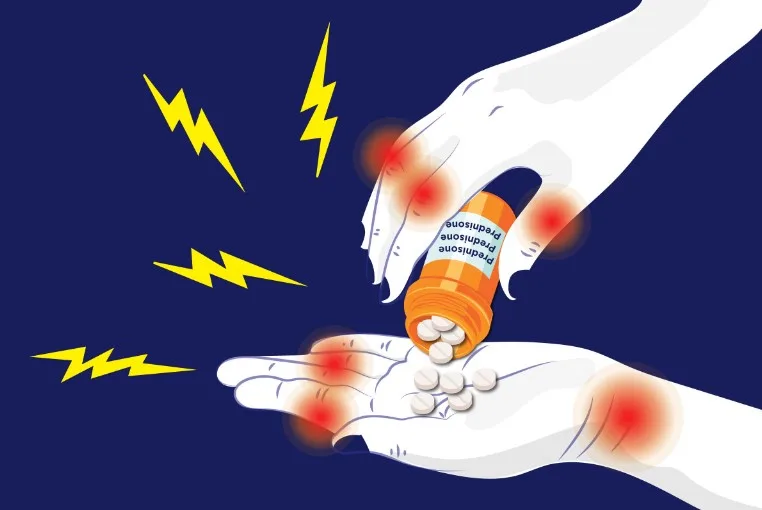A corticosteroid drug called prednisone is frequently administered to treat autoimmune diseases, allergic responses, and a range of inflammatory ailments. Prednisone has possible negative effects that users ought to become aware of, even if it can be helpful in treating some illnesses. It is crucial to comprehend these adverse effects in order to minimize risks and make well-informed judgments regarding available treatments. This post will look at five typical prednisone side effects and talk about helpful coping mechanisms.
Face Changes
The most obvious adverse effect of prednisone is alterations in facial features, commonly known as prednisone moon face. Retention of fluid and transfer of fat deposits, especially in the cheeks and neck region, are the causes of this adverse consequence. People may, therefore, have puffiness and roundness in their faces, as well as the appearance of bigger cheeks. These changes might make some people feel uncomfortable and self-conscious, but they are usually only transitory and go away when prednisone therapy is stopped or tapered off. Consider doing face workouts, eating a balanced diet to prevent weight gain overall, and adopting excellent skincare practices to reduce puffiness and improve skin health as a way to control changes to your face while taking prednisone.
Weight Gain
Gaining weight is one of the most typical adverse effects of prednisone, especially in the back, belly, and face. Fluid retention and an elevated desire, which can result in overindulging and calorie consumption, are the causes of this weight gain. Eating a balanced diet and doing regular exercise are crucial for managing weight gain when taking prednisone. Limit your intake of high-calorie junk food and concentrate on eating a balanced diet full of fruits, vegetables, lean meats, and whole grains. Including regular exercise in your regimen might help you burn off extra calories and avoid gaining weight. Creating a customized fitness program that fits your tastes and level of fitness is essential to maintaining overall well-being and getting benefits that last.
Mood Changes
Prednisone can also have an impact on behavior and mood, making some people more prone to irritation, despair, anxiety, and mood swings. The way the medicine affects hormone levels and neurotransmitters in the brain may be connected to these changes in mood. When using prednisone, it’s important to keep an eye on your mood and get help from a healthcare professional if your behavior or mood significantly changes. To treat mood issues, your doctor can occasionally advise changing the prednisone dosage or recommending using other drugs. Taking up stress-relieving techniques like yoga, deep breathing exercises, or mindfulness meditation can enhance emotional well-being and work in conjunction with medical therapies.
Insomnia
Another typical adverse effect of prednisone is insomnia or trouble falling asleep. It may be difficult to fall asleep or remain asleep during the night when using the medicine since it disrupts regular sleep patterns. Create a pleasant sleeping environment and develop a calming nighttime ritual to enhance the quality of your sleep when taking prednisone. Caffeine, nicotine, and electronics should be avoided right before bed since they might disrupt your sleep. If these remedies don’t relieve your sleeplessness, discuss possible solutions with your doctor. Some options include rearranging the schedule of your prednisone dosages or experimenting with sleep aids while under medical supervision. A peaceful nighttime routine and a focus on good sleep hygiene can improve both the quality of your sleep and your general health.
Increased Risk of Infections
Because prednisone inhibits the immune system, people are more prone to infections. Frequent colds, lung infections, infections of the urinary tract, or skin infections are some of the ways that this elevated risk of infections might present itself. Maintaining clean living areas, avoiding direct contact with ill people, and washing your hands often are all sound hygiene practices that can help lower your risk of infection when using prednisone. Maintaining current immunizations, such as yearly influenza and pneumonia injections, is also crucial for defense against avoidable illnesses. Your body’s capacity to fight off infections and preserve general well-being may be further supported by taking a proactive approach to immune health, which includes eating a diet high in nutrients and getting frequent exercise.
Final Words
Prednisone can be a useful therapy for several illnesses, but it’s important to be informed of any possible negative effects before using it. People may lessen the negative effects of prednisone on their physical and mental well-being by being aware of these side effects and putting good management techniques into place. Make sure to get advice and assistance from your healthcare professional if you have severe or ongoing adverse reactions while taking prednisone.





